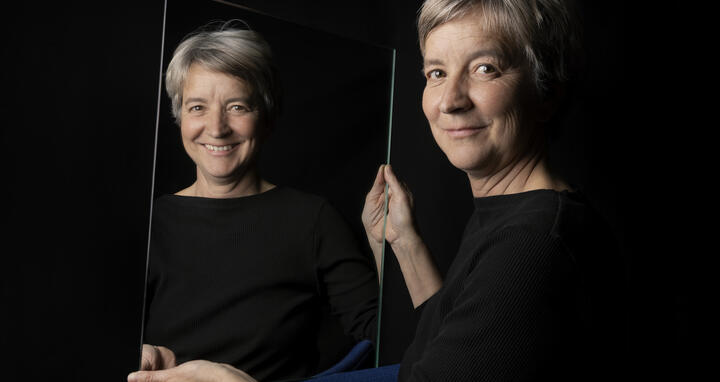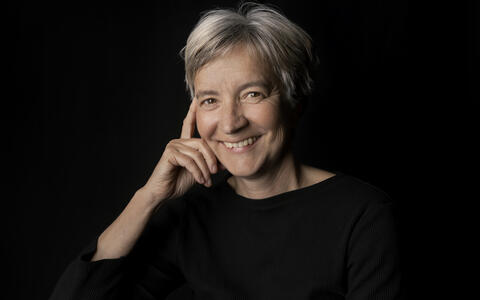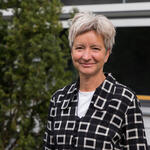A pioneer in immune cell rejuvenation
Perhaps it’s her playfulness that constantly provides Katja Simon with new avenues to explore. She enthusiastically tracks down the mechanisms that determine how cells live, age, and die. One such mechanism is autophagy, whereby cells dispose of the waste that builds up inside them in order to recycle it into new proteins, fats, and DNA – rejuvenating themselves in the process. It carries with it that most human of dreams, to look in the mirror and see the signs of age disappear.
Autophagy plays a very central role in the aging process.
This rejuvenating process of “self-digestion” occurs in almost cell types, in neurons as well as immune cells, in plants as well as humans. It involves the formation of double-membrane structures, which engulf the unneeded material and fuse it to a lysosome, the cell’s vesicle-shaped “digestive apparatus.” “Once there,” says Simon, “the cellular waste is degraded by various enzymes to amino acids, which can then be used in cell renewal.” A pioneer in the field of cellular recycling processes, she moved from Oxford University to the Max Delbrück Center in April 2022 to become head of the Cell Biology of Immunity Lab. “When autophagy is absent, immune cells age rapidly because they accumulate diseased mitochondria and other harmful organelles.”
Back in 2012, the immunologist proved that autophagy decreases in older people – and that their cells pile up more and more junk, which causes problems like muscle atrophy, hair loss, and skin changes. “Then we start to see common signs of aging: neurodegeneration, cardiovascular problems, and adult-onset diabetes,” says Simon. “Autophagy plays a very central role in the aging process.”
“Self-digestion” protects the immune system from aging
Simon is passionate about designing experiments that seek to understand how autophagy plays out in different cell types, what exactly causes it, and how to use that knowledge to cure diseases or slow down aging processes. “I truly enjoy deciphering the logic of molecular processes,” says Simon. “And when unexpected results occur, I ask the question: What’s another explanation for this?”
For example, she was able to show that the immune system ages when autophagy declines, which has a number of consequences: The macrophages that fight off bacteria no longer function as well, the memory cells of adaptive immunity decrease in number, and vaccines work less effectively. There are also more inflammatory molecules in the blood, which in turn weakens the immune response to infections and tumors, while increasing the risk of arthritis and other diseases. “If we turn off autophagy genes in immune cells, the immune system of a 2-month-old mouse looks like that of an 18-month-old mouse just before it dies,” says Simon. “That’s really bad, right?”
To prove that this is caused by autophagy, she ran an experiment in 2015 that gave aged mice with their weakened immune system a substance that is supposed to promote autophagy. Called spermidine, the substance is a metabolite found in foods such as fermented soy and aged cheese. Indeed, thanks to spermidine, the number of T cells in the mice skyrocketed after they received a flu shot – and remained almost twice as high as in young mice after 50 days. “It’s rare for experiments to produce such impressive results,” says Simon. “We showed that autophagy protects the immune system from aging.”
A fountain of youth for the immune system?
Spermidine, which we take in through our diet, is usually present in adequate amounts in people aged 65 or younger. But in people older than that, levels start declining. So, as part of a clinical trial, Simon’s team at Oxford administered spermidine to elderly people for 13 weeks after getting a COVID vaccine. “They had a markedly better vaccination response and retained their memory cells longer than those who didn’t receive spermidine,” says Simon. These findings may now help make the flu vaccine more effective in the elderly. Simon hopes the effects of spermidine will lead to the discovery of new drug targets that work more effectively and with greater precision. “That would probably translate into a rejuvenation therapy for the immune system and many tissues.”
But people can also rejuvenate their cells themselves: Exercise, fasting, intermittent fasting, and long-term calorie reduction have been shown to boost autophagy. “You give the system a push to recycle the old material,” says the 57-year-old. “I’ve been eating much less myself since I started this research.”
Without autophagy, stem cells can’t specialize
Simon is not only concerned with the immediate clinical benefits of autophagy. For example, in 2011, she demonstrated that hematopoietic stem cells, which develop into red and white blood cells, among other blood cells, do not differentiate and indeed die in the absence of autophagy. “After our study, this was also found to be true for stem cells in other tissues,” says Simon. “This provides an important basis for regenerative therapy approaches in which new tissue is derived from stem cells, as well as for bone marrow transplants to fight leukemia.”
Low autophagy levels could be one reason for hitherto unexplained cases of anemia.
Back in 2010, she observed that mice lacking the gene for autophagy in hematopoietic stem cells die of anemia. This is because red blood cells must “digest” their mitochondria and other organelles to be small enough to penetrate the smallest capillaries in the body and transport oxygen. If they do not break down their organelles, they become poisoned and perish. “Low autophagy levels could be one reason for hitherto unexplained cases of anemia,” says Simon. Here, too, spermidine is a source of hope.
The first paper she co-published at the Max Delbrück Center shows that autophagy not only digests debris inside the cell, but can also transfer valuable molecules to other cells. “It secretes signaling lipids in adipose tissue which have anti-inflammatory effects and can prevent inflammatory bowel disease.” Fat is frowned upon – but when combined with autophagy and in the right place, it has its advantages.
Three children, two postdocs, and one coincidence
Simon’s move from Oxford to the Max Delbrück Center in 2022, where she holds a Helmholtz Distinguished Professorship, was a homecoming of sorts for her. She had studied biology at Freie Universität Berlin back before the fall of the Wall, but then went to University College London to finish her degree. There she met immunologist Av Mitchison (he died in 2022), who received her at his large house in Camden. “Av was a fantastic person. Until a few years ago, he always gave me advice on what to do next.”
When Mitchison became founding director of the German Rheumatism Research Center Berlin (DRFZ), Simon went along and wrote her doctoral thesis under him. The topic she chose was T cells that trigger rheumatoid arthritis. A stint in Marseille soon followed, accompanied by her husband, the British immunologist Quentin Sattenau. In France, she did postdoctoral research on basic questions of immunology: how T cells distinguish between foreign cells and the body’s own cells, and why the body attacks itself in autoimmune diseases.
She had two children during that time. Four years later she went to Oxford University, where in 1999 she began a second postdoc in tumor immunology at the Weatherall Institute of Molecular Medicine (WIMM). She introduced a molecule called Fas ligand into skin tumor cells as a means of causing antibodies to form in the body to fight the tumor. But she did not fully believe this approach would work in a clinical setting, and did not pursue it any further. Instead, she tasked her first graduate student with working on autophagy. By chance, she had heard about the mechanism at a lecture. It fascinated her immediately – and still does today.
Five years later, she had her third child. “After that, it wasn’t easy to move forward in my career,” recalls Simon. “I published a lot, but with gaps. And I only got the opportunity to show that I could lead a laboratory late in the game.” She conducted experiments herself for a long time. In 2008, she became the head of her own lab at the WIMM and then at the Kennedy Institute of Rheumatology at Oxford. Today, as an established professor, she advocates for women. “More women would be good for science,” says Simon. “There would be more teamwork and progress would be less based on competition alone.”
Good data – to keep people healthy
At the Max Delbrück Center, Simon wants to start new clinical studies, focusing her attention on autophagy in immune cells that cause inflammation in tissues such as the heart and brain. “At Oxford I was at an institute focused entirely on immunology. That was fantastic, but in Berlin I see that my horizon is broadening.”
For example, she is collaborating with Dominik Müller, Friedemann Paul, and Anja Mähler at the Experimental and Clinical Research Center (ECRC). She wants to find out how healthy elderly people can benefit at the cellular level from fasting, as well as how exactly dietary supplements like spermidine work. Yet even though they are available for purchase, few have been studied seriously in clinical trials. “We want to make really good data available now so that people can better assess whether fasting, a vegan diet, or taking spermidine is right for them,” Simon says. “Publicly funded research should ultimately shed light on how we can change our lifestyle to stay healthy.”
Text: Mirco Lomoth







